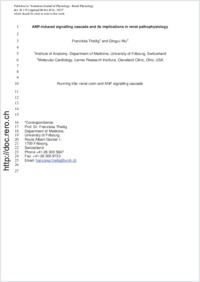ANP-induced signalling cascade and its implications in renal pathophysiology
- Theilig, Franziska Department of Medicine, University of Fribourg. Switzerland
- Wu, Qinyu Molecular Cardiology, Nephrology and Hypertension, Lerner Research Institute, Cleveland, USA
-
28.01.2015
Published in:
- American Journal of Physiology - Renal Physiology. - 2015, vol. 308, no. 10, p. F1047-F1055
English
The balance between vasoconstrictor/sodium retaining and vasodilator/natriuretic systems is essential for maintaining body fluid and electrolyte homeostasis. Natriuretic peptides, such as atrial natriuretic protein (ANP) belong to the vasodilator/natriuretic system. ANP is produced by the conversion of pro-ANP into ANP which is achieved by a proteolytical cleavage executed by corin. In the kidney, ANP binds to the natriuretic peptide receptor-A (NPR-A) and enhances its guanylyl cyclase activity, thereby increasing intracellular cyclic guanosine monophosphate production to promote natriuretic and renoprotective responses. In the glomerulus, ANP increases glomerular permeability and filtration rate and antagonizes the deleterious effects of the renin-angiotensin-aldosterone system activation. Along the nephron, natriuretic and diuretic actions of ANP are mediated by inhibiting the basolaterally expressed Na⁺/K⁺-ATPase, reducing apical sodium, potassium and protein organic cation transporter in the proximal tubule, and decreasing the Na⁺-K⁺-2Cl- co-transporter activity and the renal concentration efficiency in the thick ascending limb. In the medullary collecting duct, ANP reduces sodium reabsorption by inhibiting the cyclic nucleotide gated cation channels, the epithelial sodium channel, and the heteromeric channel transient receptor potential-vanilloid 4 and -polycystin 2 and diminishes vasopressin-induced water reabsorption. Long term ANP treatment may lead to NPR-A desensitization and ANP-resistance, resulting in augmented sodium and water reabsorption. In mice, corin deficiency impairs sodium excretion and causes salt-sensitive hypertension. Characteristics of ANP resistance and corin deficiency are also encountered in patients with edema-associated diseases, highlighting the importance of ANP-signalling in salt-water balance and renal pathophysiology.
- Faculty
- Faculté des sciences et de médecine
- Department
- Département de Médecine
- Language
-
- English
- Classification
- Biological sciences
- License
-
License undefined
- Identifiers
-
- RERO DOC 235650
- DOI 10.1152/ajprenal.00164.2014
- Persistent URL
- https://folia.unifr.ch/unifr/documents/304260
Statistics
Document views: 100
File downloads:
- pdf: 199
